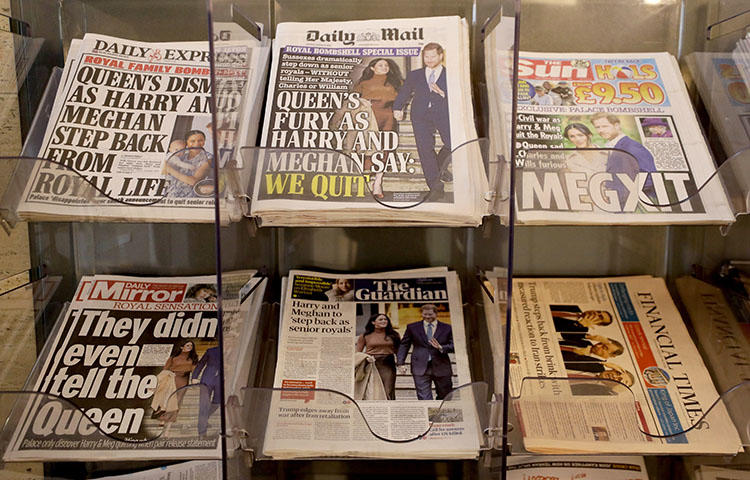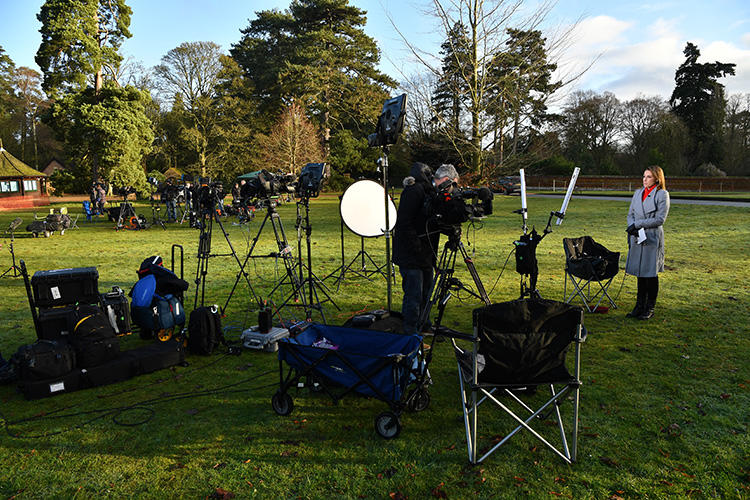Journalists and press associations in the United Kingdom this week debated issues of access and what constitutes “credible media,” as royal correspondents scrutinized the fall out from “Megxit”—the Duke and Duchess of Sussex’s plan to step back from royal duties and the pool system of news coverage—and the Society of Editors raised concerns with Prime Minister Boris Johnson over the relocation of daily press briefings, calling for assurances that the move will not be used to bar access to certain reporters.
While many people may sympathize with Prince Harry and his wife, former American actress Meghan Markle, who have come under intense media scrutiny, their rules of media engagement, including plans to provide access only to “credible media outlets,” put the couple in poor company.
In the case of Downing Street, journalism organizations including the Society of Editors say the move will make covering Parliament harder and could allow the government to block critical reporters.
Both moves put the British press—and in turn, the public—at a disadvantage and risk setting an example for leaders and powerful figures elsewhere to similarly argue for more media restrictions.
Michelle Stanistreet, general secretary of the National Union of Journalists, criticized the decisions in a January 9 statement, saying, “Both instances appear to attempt to prevent the media from functioning and compromising the ability of journalists to do their jobs, which is completely unacceptable.”
The Duke and Duchess announced their decision after months of negative coverage and complaints over invasion of privacy. Both spoke in an ITV documentary aired last year of how the coverage has impacted their well-being and the Duchess has filed a lawsuit against the British newspaper Mail on Sunday over its publication of a private letter.

Among the newspaper articles and columns about the split between the Sussexes and the rest of the Royal Family, the British press has largely argued for access based on British taxpayers funding the couple through the Sovereign Grant, which pays 5% of their costs, and the Metropolitan police security detail, as well as their patronage of charities, profile as royalty, and funding through the Prince of Wales.
As the National Union of Journalists pointed out, “The rota system is not perfect, but it does allow UK media to cover the British Royal Family—an institution maintained by the public purse.”
Stanistreet added, “Any so called reforms must enhance access and improve transparency rather than allowing access to public figures, regardless of who they are, on a grace and favor basis.”
The Duke and Duchess’s statement says they “believe in a free, strong and open media industry” but their plan to offer access for “credible media” only and sharing information directly via social media is a set-up favored more often by world leaders seeking to either censor or discredit the press.
In Thailand, for instance, the country’s lèse-majesté law, which carries up to 15 years in prison for criticism of the monarch, has become an effective way for military leaders to stifle coverage and silence critics, the BBC reported.
Russia also opts for stage-managed press relations. At President Vladimir Putin’s annual press gathering, attended by over 1,800 journalists, the Russian leader is able to present a façade of openness while remaining in control of the flow of information. An ABC report on the 2019 conference, which the broadcaster noted came in at just over four hours, said that the Kremlin approved some questions beforehand and that journalists present appeared predominately pro-Putin, often applauding his comments and booing tougher questions.
Putin and the Thai authorities have vastly different reasons to control the press, but any attempt to limit access or label one journalist over another as credible is a dent to press freedom and could validate the behavior of those seeking to stifle debate.
The Duke and Duchess’s plan to rely on social media is also a method favored by world leaders to control the narrative, often under the guise of transparency. A 2018 “Twiplomacy” study by U.S. public relations firm Burson Cohn & Wolfe identified 951 Twitter accounts belonging to heads of state and government and foreign ministers in 187 countries.
When President Barack Obama’s office announced the launch of the @POTUS account in May 2015, the statement said Obama wanted his “administration [to be] the most open and participatory,” and hailed the use of Twitter as a way for the president to directly engage with Americans. But, as CPJ noted in its 2013 report, his administration used its own media to evade press scrutiny.
President Donald Trump also uses social media to circumvent the press and the norms of office. He even argued—over Twitter—that a tweet was sufficient notice to Congress of his decision to take military action against Iran last week. Despite a steady slew of tweets and impromptu press chats, as of January 7 CNN reported a press briefing has not been held for over 300 days. White House press secretary Stephanie Grisham has downplayed the need for regular briefings, with Politico reporting in September that she described the briefings, during a Fox and Friends interview, as an act of “theater” for reporters seeking “to get famous.”
Elsewhere, leaders from Brazil’s Jair Bolsonaro, who blasted a journalist on Twitter who was investigating his son, and Nayib Bukele in El Salvador, whose administration banned two journalists from press briefings, rely on social media and avoid uncomfortable questions from reporters.
While the British parliament isn’t retreating from its twice-daily press briefings, the decision to move the location has potentially troubling repercussions.
The Independent reported on January 6 that the briefings were moved from the Houses of Parliament to 9 Downing Street, and that power over who controls access will be moved from Parliamentary authorities to the government.
Ian Murray, executive director of the Society of Editors, told CPJ the relocation could “hamper the ability of the media to scrutinize the government.”
The Society of Editors’ letter said that the move will make it harder for “lobby correspondents”—reporters granted privileged access to Parliament—to cover Westminster. It cited issues including navigating security, not being able to carry a mobile phone, and the distance between 9 Downing Street and Parliament making it harder to cover parliamentary sessions and the briefings.
A spokesperson for the prime minister’s office told CPJ via email yesterday that journalists would be allowed to keep their phones. The spokesperson added, “This change means senior officials are more readily available to members of the press and has neither changed the frequency of briefings nor the level of press access.”
While acknowledging that the move would allow access to more government advisers, Murray said he was concerned about the lack of consultation with the press and added that the move would have an impact on smaller news outlets.
“There are concerns that the government could, at some time in the future, use the new arrangements to restrict access to the briefings, although nothing has been suggested from the new administration along those lines,” Murray said via email, adding, “On the whole this is a strange state of affairs from an administration that has a journalist as its Prime Minister—both regional and national papers—and has expressed strong support for a free press and freedom of expression.”
